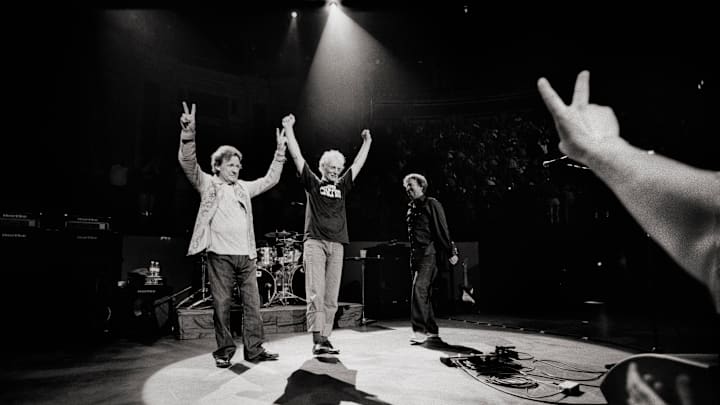Supergroups began in earnest in the music of the 1960s. Things may have been different though had a 1950s jamming session gone further in terms of even more records and gigs.
Million Dollar Quartet was a recording of a fun studio session in Memphis in 1956 featuring Elvis Presley, Jerry Lee Lewis, Carl Perkins, and Johnny Cash. It wasn't released until the 1980s and the supergroup tag is only loosely applied, but it was some collection of musical stars as the name shows.
That leads neatly to the point of defining again what a supergroup is. Using the same criteria as in an earlier article, Five astoundingly successful 1970s supergroups, the core of the musicians need to have been successful artists either solo or with a band previously. The supergroup needs to release at least one album and have a tour to qualify too.
Supergroups of the 1960s
That's all pretty straightforward, it does rule out some groups that may have been otherwise considered. Eric Clapton and The Powerhouse fall into that not quite category. That was a bunch of friends namely, Steve Winwood, Jack Bruce, and Paul Jones from Manfred Mann who got together with Eric Clapton in 1966. They recorded and released just three songs from their brief existence.
Three of those four do feature heavily in supergroups from the 1960s though. Clapton, Winwood, and Bruce are part of a trail of musicians who regularly joined up with other star artists to perform in some astounding collaborations. With those in mind, let’s focus on Cream, one of the first great supergroups, which then led to several others following afterward. I’ll come back to cover other great supergroups formed in the 1960s in another article soon.
Cream the 1960s supergroup that led to several more
Cream was a superb group with some outstanding music by any standards. The band started as an idea between Clapton and drummer Ginger Baker. They were both looking for something new. Clapton after establishing himself as a top guitarist with the Yardbirds and John Mayall & the Bluesbreakers. Baker was playing with the Graham Bond Organization but was very ready to move on.
The surprise came when Clapton suggested Jack Bruce, also playing in the Graham Bond Organisation, to Baker as their bass player. Bruce and Baker had been at loggerheads, even fighting onstage during gigs. Bruce and Clapton had played together occasionally and reckoned they’d make a good trip, despite those last differences.
Continued on next slide
